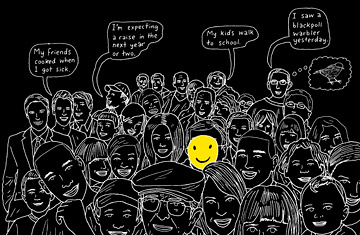
(2 of 4)
The first step in making GNH useful is to measure it. Bhutan's 2010 GNH survey was nearly seven years in the making, and its results were released earlier this year. Researchers translated the core ideas into nine equally weighted components of happiness. To measure them, they designed hundreds of survey questions, eventually interviewing 8,000 of Bhutan's 738,000 people in their homes to ask intensely personal, thought-provoking questions: "How many people can you count on for help in case you get sick? How often do you talk about spirituality with your kids? When did you last spend time socializing with your neighbors? How comfortable are you with your level of household debt?" Taken together, the answers form Bhutan's first baseline GNH index--0.743 on a scale that goes up to 1.
That score represents the most comprehensive effort yet to devise an alternative to GDP, but it is certainly not the only one. Since the 2008 global financial crisis, the calls to rethink GDP have grown more vehement. "The crisis was very helpful because people realized the GDP wasn't telling us anything about what was going on," says Joseph Stiglitz, a Nobel Prize--winning economist. "When Bhutan took up GNH, some people said it was because they wanted to take attention away from lack of development. I think quite the contrary. The crisis has made us aware of how bad our metrics were even in economics, because U.S. GDP looked good, and then we realized it was all a phantasm."
What's the alternative? Stiglitz has become the world's leading advocate for developing better measures of national well-being. He leads an influential commission funded by the French government to come up with better ways of measuring it. In response, the Organisation for Economic Co-operation and Development put together the Your Better Life Index, a new Web tool that allows users to rank countries according to 11 measures of well-being. The tool recognizes that everyone has a different idea of what happiness looks like; you can weight the index accordingly and recalculate.
If work-life balance and the environment are most important, Denmark and Sweden rank highest. Give more weight to income and health, and the U.S. and Switzerland top the chart. Stiglitz acknowledges that measures of well-being won't displace GDP but believes they will certainly supplement it. "I don't have any fear that it won't take hold," he says. "The question is the pace with which they are implemented."
The pace is picking up in Canada, where the province of Alberta and the city of Edmonton have supported the development of the Canadian Index of Wellbeing. It's similar to Bhutan's GNH Index, but instead of using survey questions, Canadian researchers created a composite of 64 existing statistics, including work hours and incidence of violent crime, that are considered proxies for various components of well-being. "We didn't ask Canadians how they feel," says Mark Anielski, who led the project.
